外研版英语必修一Module1-Module3重点知识总结
新教材 外研版高中英语选择性必修第一册全册各单元知识点提炼汇总(单词短语句型语法等详解及扩展)
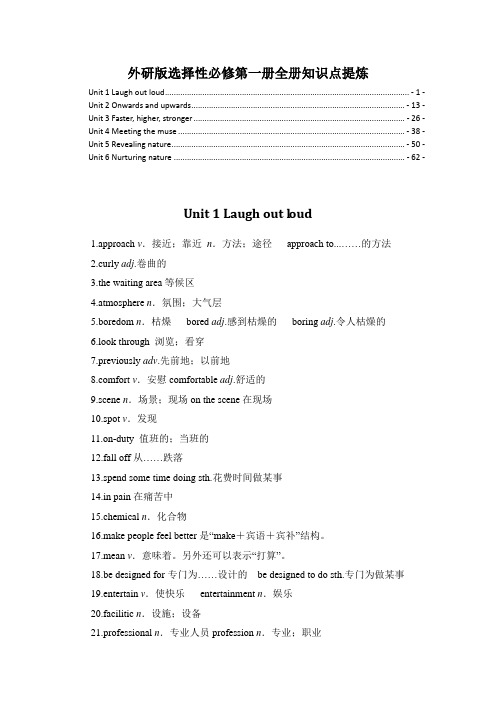
外研版选择性必修第一册全册知识点提炼Unit 1 Laugh out loud ............................................................................................................... - 1 - Unit 2 Onwards and upwards ................................................................................................. - 13 - Unit 3 Faster, higher, stronger ................................................................................................ - 26 - Unit 4 Meeting the muse ....................................................................................................... - 38 - Unit 5 Revealing nature .......................................................................................................... - 50 - Unit 6 Nurturing nature ......................................................................................................... - 62 -Unit 1 Laugh out l oud1.approach v.接近;靠近n.方法;途径approach to...……的方法2.curly adj.卷曲的3.the waiting area等候区4.atmosphere n.氛围;大气层5.boredom n.枯燥bored adj.感到枯燥的boring adj.令人枯燥的6.look through 浏览;看穿7.previously adv.先前地;以前地fort v.安慰comfortable adj.舒适的9.scene n.场景;现场on the scene在现场10.spot v.发现11.on-duty 值班的;当班的12.fall off从……跌落13.spend some time doing sth.花费时间做某事14.in pain在痛苦中15.chemical n.化合物16.make people feel better是“make+宾语+宾补”结构。
(完整word版)外研社高中英语必修一Module1-6所有重点归纳-推荐文档
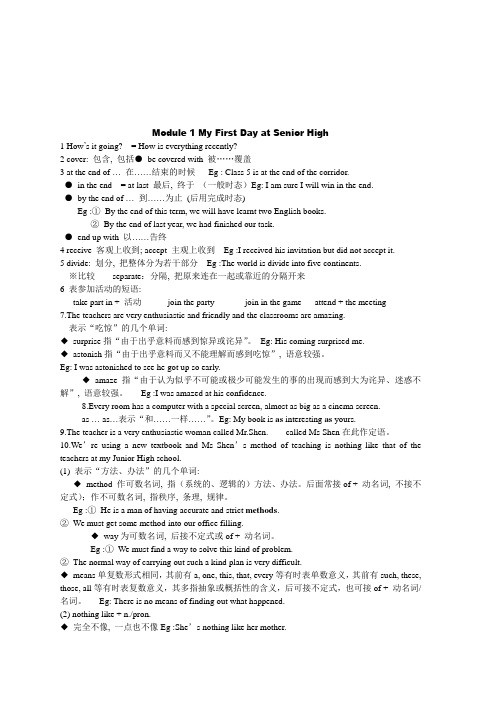
Module 1 My First Day at Senior High1 How’s it going? = How is everything recently?2 cover: 包含, 包括●be covered with 被……覆盖3 at the end of …在……结束的时候Eg : Class 5 is at the end of the corridor.●in the end = at last 最后, 终于(一般时态)Eg: I am sure I will win in the end.●by the end of …到……为止(后用完成时态)Eg :①By the end of this term, we will have learnt two English books.②By the end of last year, we had finished our task.●end up with 以……告终4 receive 客观上收到; accept 主观上收到Eg :I received his invitation but did not accept it.5 divide: 划分, 把整体分为若干部分Eg :The world is divide into five continents.※比较separate:分隔, 把原来连在一起或靠近的分隔开来6 表参加活动的短语:take part in + 活动join the party join in the game attend + the meeting7.The teachers are very enthusiastic and friendly and the classrooms are amazing.表示“吃惊”的几个单词:◆surprise指“由于出乎意料而感到惊异或诧异”。
Eg: His coming surprised me.◆astonish指“由于出乎意料而又不能理解而感到吃惊”, 语意较强。
外研版高一英语book1module1-module3知识点整理课件

cities. It covers anarea of 15,000 square meters and
can be divided i_n_t_o_3 parts. The items on show are
twice as enjoying
many as t_h_o_s__e_
yourselves, the
活学活用⑵ Eventually,the movie star the fans had looked
forward to turned up.
⑶ Time ran out before we could get down to solving
the problem.
7. in other words 换句话说 拓展: 总而言之 _in__a__/ _o_n_e_w__o_rd__ 有消息传来说__W__o_rd__c_a_m__e_t_h_at…
the inssttrruucctitoinosn of the guide while trtraavvelllliendg.
Guide: You are welcome to take part _i_n_the activity held by our museum. Our museum is nothing like t_h_a_tin other
活学活用:⑵The children divided the candies among themselves.
⑶They walked a mile together and then separated.
10. take (an active )part in 参加 参加活动_jo_i_n__in______(口语常用) pa_r_ti_c_ip_a_t_e_i_n__(正式) 参加、出席会议、宴会、婚礼、葬礼等场合_a_t_t_e_n_d 参加(党派、团体、组织)成为其中一员joi_n__s_b_./_s_th_. 加入某人做某事 _jo_i_n_s_b_._i_n_d__o_in_g___
(完整版)外研版高中英语必修1重要知识点归纳
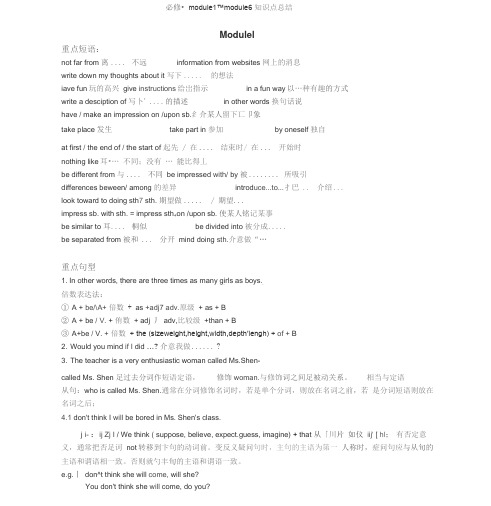
必修• module1™module6 知识点总结Modulel重点短语:not far from 离.... 不远information from websites 网上的消息write down my thoughts about it 写下..... 的想法iave fun玩的高兴give instructions给岀指示in a fun way以…种有趣的方式write a desciption of 写卜' .... 的描述in other words 换句话说have / make an impression on /upon sb.纟介某人留下匸卩象take place 发生take part in 参加by oneself 独自at first / the end of / the start of 起先/ 在.... 结束时/ 在... 开始时nothing like耳•… 不同;没有… 能比得丄be different from 与.... 不同be impressed with/ by 被........ 所吸引differences beween/ among 的差异introd uce...to...扌巴 .. 介绍...look toward to doing sth7 sth. 期望做..... / 期望...impress sb. with sth. = impress sth+on /upon sb. 使某人铭记某事be similar to 耳.... 桐似be divided into 被分成.....be separated from 被和 ... 分开mind doing sth.介意做“…重点句型1. In other words, there are three times as many girls as boys.f J - J倍数表达法:①A + be/\A+ 倍数+ as +adj7 adv.原级+ as + B②A + be / V. + 侑数+ adj 丿adv,比较级+than + B③A+be / V. + 倍数+ the (sizeweight,height,width,depth’lengh) + of + B2. Would you mind if I did …? 介意我做...... ?3. The teacher is a very enthusiastic woman called Ms.Shen-called Ms. Shen 足过去分词作短语定语,修饰woman.与修饰词之间足被动关系。
外研版英语必修一Module1-Module3重点知识总结
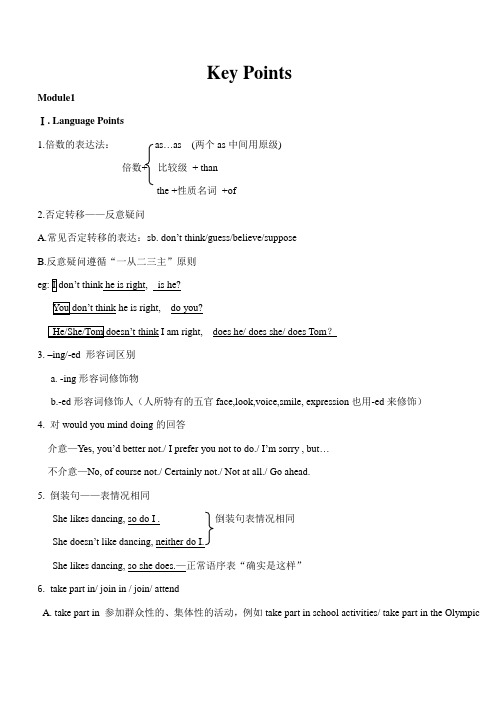
Key PointsModule1Ⅰ. Language Points1.倍数的表达法:as…as (两个as中间用原级)倍数+ 比较级+ thanthe +性质名词+of2.否定转移——反意疑问A.常见否定转移的表达:sb. don’t think/guess/believe/supposeB.反意疑问遵循“一从二三主”原则’t think he is right, is he?do you?does he/ does she/ does Tom?3. –ing/-ed 形容词区别a. -ing形容词修饰物b.-ed形容词修饰人(人所特有的五官face,look,voice,smile, expression也用-ed来修饰)4. 对would you mind doing的回答介意—Yes, you’d better not./ I prefer you not to do./ I’m sorry , but…不介意—No, of course not./ Certainly not./ Not at all./ Go ahead.5. 倒装句——表情况相同倒装句表情况相同She doesn’She likes dancing, so she does.—正常语序表“确实是这样”6.take part in/ join in / join/ attendA. take part in 参加群众性的、集体性的活动,例如take part in school activities/ take part in the OlympicGamesB. join in 参加正在进行的竞赛活动常用join sb. (in) doingC. join 参加某个组织或团体,例如,join the Party(共产党) /join the league(共青团)/ join the army(参军)D. attend正式用语,常指参加婚葬,会议,典礼,上学,上课等,例如,attend the wedding(婚礼) attendthe funeral(葬礼) attend class(上课) attend school(上学)7. matter的用法It doesn’t matter if…如果…没关系Does it matter if…如果…有关系吗?It matters a lot if…如果…很要紧Ⅱ. Key Phrasesat the start/ beginning of 在…的开始/开端at the end of 在…的末尾attitude to/towards 对…的态度in other words换句话说take part in/ join/ join sb. (in) doing/ attend 参加divide sth. into = sth. be divided into 把…划分为move to 搬到…look forward to doing 期盼做某事feel/get/be bored with 对…感到厌倦be impressed with 某人对…印象深刻leave a deep impression on/ leave an unforgettable impression on …给某人留下深刻印象/…给某人留下难忘的印象用这种方式:in this way in this manner with this method by this meansⅢ. Grammar——————一般现在时1.经常性、习惯性动作用一般现在时She goes to see the film once a week.He always/often/usually/sometimes/never/seldom talks with others.2.客观规律The teacher said that the earth travels around the sun.The light travels faster than sound.3.在if引导的条件状语从句中,主句用将来时,从句用一般现在时,也就是“主将从现”I will go to Xi’an if it doesn’t rain tomorrow.主将从现Ⅳ. Everday English——How are you doing?=How is it going?某事进展的怎么样?——Fine./ Not bad.Module2Ⅰ. Language Points1.with 的用法A. with + 宾语+ adj./ adv./介词短语a. with + 宾语+ adj.Don’t talk with your mouth full.b. with + 宾语+ adv.The room is bright with all the lights on.c. with + 宾语+ 介词短语Ms. Liu comes into classroom with a book in her hand.B. with + 宾语+ V. (看宾语和动词之间的关系)a. 主动——ingThe mother left, with the baby crying.b. 被动——doneHe is sleeping with the window closed.c. 还没做With so much homework to do, I can’t go out.2. so…that…﹠so thatA. so…that…如此…以致于…She explains English grammar so clear that even I can understand it.B. so that 引导结果状语从句,译为“因此”Mrs. Liu just smiles, so that you don’t feel completely stupid.3.appreciate 的用法A. appreciate (one’s) doing 感激(某人)做某事I appreciate your helping me.B. I would appreciate it if…如果…我将感激不尽I would appreciate it if you help me.4. admit 的用法A. admit doing 承认做了某事He admitted breaking the window.B. sb. be admitted to/into 被…录取或接收I was admitted to/into Peking University.5. prefer 的用法(preferring, preferred)A. prefer sth. 更喜欢…—Which one do you prefer, the apple or the pear?—I prefer apple.B. prefer sth to sth. 比起…更喜欢…I prefer apple to banana. 比起香蕉我更喜欢苹果C.prefer doing sth. to doing sth. 比起做…更喜欢做…I prefer dancing to singing. 比起唱歌,我更喜欢跳舞D.prefer to do rather than do 宁愿…也不愿…Rather than talk with us, he prefers to play alone.6. would rather 的用法A. would rather (not) do宁愿(不)做…I would rather stay at home.B. would rather do than do 宁愿做…也不愿…I would rather stay at home than go to see the movies.Ⅱ. Key Phrasesin fact事实上fall asleep(fall的过去式是fell)睡着tell joks讲笑话(tell的过去式told) make progress取得进步(progress不可数)make a lot of/great/much progress取得巨大进步as a result结果as a result of=because of由于respectful=polite有礼貌的respectable体面的,正派的,值得尊敬的be patient with sb.对某人有耐心be popular in sp.在某地受欢迎be popular with sb.在某个人群当中受欢迎be strict with sb. in sth. 在某方面对某人要求严格admit doing承认做了某事sb. be admitted to某人被…接收或录取appreciate one’s doing感激某人做某事I would appreciate it if you….如果…我将感激不尽consider doing考虑做某事nothing like 完全不像make sb. do sth / sb. be made to do 使某人做某事prefer doing A to doing B 比起做A更喜欢做B prefer to do rather than do 宁愿做…也不愿做…would rather (not) do 宁愿(不)做…would rather do than do 宁愿做…也不愿做…have problems with sth. 在某方面有问题have problem/difficulty (in) doing 做某事有困难Ⅲ. Grammar1.非限制性定语从句A.标志: “,”将主从句隔开B.指人时,主语用who, 宾语用whomHe is a doctor, who is in his thirties.The old man has two sons, one of whom is a scientist.C.指物只能用which (在限制性定语从句中既可用which也可用that来指物)This is the house, which I lived in ten years ago.D.指地点用whereThis is the house, where I lived ten years ago.2.V. + doing/ to doA.只能接doingB.既能接doing, 又能加to do, doing表做过了,to do还没做要去做remember to do/ doing forget to do/ doing stop to do/ doing go on to do/ doing C.接doing与接to do时意义差别较大try to do 努力尽量做try doing 尝试做regret to do对将要做的事感到抱歉regret doing 后悔做了某事mean to do 打算计划做某事mean doing 意味着sb. need to do 某人必须做某事sth. need doing 某物需要…can’t help sb. to do不能帮某人做某事can’t help doing情不自禁Ⅳ. Everyday EnglishHave you got that? 你听说了吗?/你明白了吗?It’s up to you. 由你决定That’s settled.就这么定了Take/Have a look at…看一看… a couple of things 两三件事情Module 3Ⅰ. Language Points1.get on/off﹠get into/out of﹠take offget on/off 上下(bus, train, plain, ship) get into/out of 上下(taxi, car) take off: 起飞;脱掉2. so﹠suchA. so beautiful a girl/ such a beautiful girlB. such + 可数名词复数/ 不可数名词such little children/ such great progress(such little:这么小)C. so many/much/littleso many+可数名词复数“如此多”eg:so many studentsso much+不可数名词“如此多”eg: so much moneyso little+不可数名词“如此少”eg: so little food3.refer to 的多层含义(refer过去式referred)A.参考,查阅For further information, you can refer to the website of our company.B.提到,涉及When she said someone was stupid, I’m she didn’t refer to me.C.归功于He referred his success to the good education he has received.D.适用于These books refers to students under 10 years old.Ⅱ. Key Phrasesbe short for…的缩写或简称at midnight 在午夜out of date 过期的,过时的at a speed of 以…的速度the rest of 剩余的/其他的…for the first time平生第一次play with 和…玩all the time 一直,总是Ⅲ. Grammar——过去分词作后置定语﹠插入语1. 动词过去分词做后置定语: done, to be dong, being done 可以做后置定语修饰一个名词eg. The question discussed at the meeting yesterday 昨天在会上讨论的问题The question being discussed at the meeting now会议上正在讨论的问题The question to be discussed at the meeting tomorrow明天会上将被讨论的问题2. 插入语:在一个句子中间插入的一个成分,它不作句子的任何成分,可有可无。
外研版高一英语必修一Module_1---4_总结材料复习
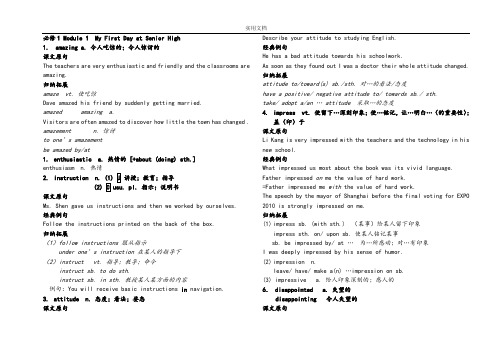
必修1 Module 1 My First Day at Senior High1. amazing a. 令人吃惊的;令人惊讶的课文原句The teachers are very enthusiastic and friendly and the classrooms are amazing.归纳拓展amaze vt. 使吃惊Dave amazed his friend by suddenly getting married.amazed amazing a.Visitors are often amazed to discover how little the town has changed . amazement n. 惊讶to one’s amazementbe amazed by/at1.enthusiastic a. 热情的 [+about (doing) sth.]enthusiasm n. 热情2.讲授;教育;指导指示;说明书课文原句Ms. Shen gave us instructions and then we worked by ourselves. 经典例句Follow the instructions printed on the back of the box.归纳拓展(1)follow instructions 服从指示under one’s instruction 在某人的指导下(2)instruct vt. 指导;教导;命令instruct sb. to do sth.instruct sb. in sth. 教授某人某方面的内容例句:You will receive basic instructions in navigation.3.attitude n. 态度;看法;姿态课文原句Describe your attitude to studying English.经典例句He has a bad attitude towards his schoolwork.As soon as they found out I was a doctor their whole attitude changed. 归纳拓展attitude to/toward(s) sb./sth. 对…的看法/态度have a positive/ negative attitude to/ towards sb./ sth.take/ adopt a/an … attitude 采取…的态度4.impress vt. 使留下…深刻印象;使…铭记,让…明白…(的重要性);盖(印)于课文原句Li Kang is very impressed with the teachers and the technology in his new school.经典例句What impressed us most about the book was its vivid language. Father impressed on me the value of hard work.=Father impressed me with the value of hard work.The speech by the mayor of Shanghai before the final voting for EXPO 2010 is strongly impressed on me.归纳拓展(1)impress sb. (with sth.) (某事)给某人留下印象impress sth. on/ upon sb. 使某人铭记某事sb. be impressed by/ at …为…所感动;对…有印象I was deeply impressed by his sense of humor.(2)impression n.leave/ have/ make a(n) …impression on sb.(3) impressive a. 给人印象深刻的;感人的6. disappointed a. 失望的disappointing 令人失望的课文原句They were both disappointed with their lessons.归纳拓展disappoint vt./vi. 使…失望be disappointed at/ about sth.令人失望的人;令人扫兴的事;失望;扫兴;沮丧to one’s appointment经典例句I’m sorry to disappoint you, but I can’t come after all. Nathan’s really disappointed about not being about to go.7.cover vt. 盖;掩盖;行走(路程);(记者)采访、报道;占用(一段时间或空间);包含;涉及;(钱)够…用n. 封面;盖子课文原句Secondary school in the US usually covers seven years, grades six to twelve.经典例句The city covers 25 square miles.Tom was sent to Switzerland to cover the Winter Olympics.归纳拓展(1)cover…with…be covered with…覆盖着(强调状态)be covered by…覆盖着(强调动作)cover sth. up 遮盖;隐瞒(2)discover vt. 发现uncover vt. 揭发,揭露•She is so shy that she covered her face with her hands.•The government is trying to cover up the scandal.8.in other words 换句话说,也就是说课文原句In other words, there are three times as many girls as boys.归纳拓展(1) in a/one word 简言之,总之(3)keep one’s words/ promise 遵守诺言break one’s words/ promisehave a word with sb. 与某人交谈。
外研版英语高中必修一MODULE1-MODULE3重要知识点总结
外研版英语高中必修一MODULE1-MODULE 6重要知识点总结1.amazing a. 令人吃惊的;令人惊讶的课文原句The teachers are very enthusiastic and friendly and the classrooms are amazing.归纳拓展amaze vt. 使吃惊Dave amazed his friend by suddenly getting married.amazed amazing a.Visitors are often amazed to discover how little the town has changed .amazement n. 惊讶to one’s amazementin amazementbe amazed by/atbe amazed to do sth.be amazed that…2.enthusiastic a. 热情的[+about (doing) sth.]enthusiasm n. 热情3.instruction n. (1) U 讲授;教育;指导(2) C usu. pl. 指示;说明书课文原句Ms. Shen gave us instructions and then we worked by ourselves.经典例句Follow the instructions printed on the back of the box.归纳拓展(1)follow instructions 服从指示under one’s instruction 在某人的指导下(2)instruct vt. 指导;教导;命令instruct sb. to do sth.instruct sb. in sth. 教授某人某方面的内容例句:You will receive basic instructions in navigation.4.attitude n. 态度;看法;姿态课文原句Describe your attitude to studying English.经典例句He has a bad attitude towards his schoolwork.As soon as they found out I was a doctor their whole attitude changed.归纳拓展attitude to/toward(s) sb./sth. 对…的看法/态度have a positive/ negative attitude to/ towards sb./ sth.take/ adopt a/an … attitude 采取…的态度5.impress vt. 使留下…深刻印象;使…铭记,让…明白…(的重要性);盖(印)于课文原句Li Kang is very impressed with the teachers and the technology in his new school.经典例句What impressed us most about the book was its vivid language.Father impressed on me the value of hard work.=Father impressed me with the value of hard work.The speech by the mayor of Shanghai before the final voting for EXPO 2010 is strongly impressed on me. 归纳拓展(1)impress sb. (with sth.) (某事)给某人留下印象impress sth. on/ upon sb. 使某人铭记某事sb. be impressed by/ at … 为…所感动;对…有印象I was deeply impressed by his sense of humor.(2)impression n.leave/ have/ make a(n) …impression on sb.(3) impressive a. 给人印象深刻的;感人的6.disappointed a. 失望的disappointing 令人失望的课文原句They were both disappointed with their lessons.归纳拓展disappoint vt./vi. 使…失望be disappointed at/ about sth.be disappointed in/with sb./ sth.be disappointed to do sth.be disappointed that…disappointment n. C 令人失望的人;令人扫兴的事;U 失望;扫兴;沮丧to one’s appointment经典例句I’m sorry to disappoint you, but I can’t come after all.Nathan’s really disappointed about not being about to go.7.cover vt. 盖;掩盖;行走(路程);(记者)采访、报道;占用(一段时间或空间);包含;涉及;(钱)够…用n. 封面;盖子课文原句Secondary school in the US usually covers seven years, grades six to twelve.经典例句The city covers 25 square miles.Tom was sent to Switzerland to cover the Winter Olympics.归纳拓展(1)cover…with…be covered with… 覆盖着(强调状态)be covered by… 覆盖着(强调动作)cover an area of … 占地面积…cover sth. up 遮盖;隐瞒(2)discover vt. 发现uncover vt. 揭发,揭露recover vt. 追回;收复vi.恢复健康(from)•She is so shy that she covered her face with her hands.•The government is trying to cover up the scandal.•recover stolen goods/ lost property•Six bodies were recovered from the wreck.•recover one’s sight, hearing, the strength•recover from the shock/ surprise•Trade soon recovered from the effects of the war.8.in other words 换句话说,也就是说课文原句In other words, there are three times as many girls as boys.归纳拓展(1) in a/one word 简言之,总之in words 用语言word for word 逐字的(3)keep one’s words/ promise 遵守诺言break one’s words/ promisehave a word with sb. 与某人交谈。
新教材-外研版高中英语必修第一册全册各单元知识点提炼汇总(单词短语句型语法等详解及扩展)
外研版必修第一册全册各单元知识点汇总Unit 1 A new start .................................................................................................................... - 1 -Unit 2 Exploring English ....................................................................................................... - 15 -Unit 3 Family matters ............................................................................................................ - 29 -Unit 4 Friends forever............................................................................................................ - 43 -Unit 5 Into the wild ................................................................................................................ - 57 -unit 6 At one with nature........................................................................................................ - 64 -Unit 1 A new start重点单词1.picture vt.想象;描写2.over and over again反复地3.wake up醒来wake的过去式为woke,过去分词为woken,现在分词为waking。
高一英语必修一外研版每单元语法经典总结
Module 1 My First Day at Senior HighGrammar 2:分词形容词英语中有些形容词是由动词的---ing 构成的(通常表示事物给人的感觉,意为“是令人感到…..的”),有些形容词是由动词的------ed 构成的(通常表示人对事物的感觉,意为“对……感到……的”)。
前者表示主动的意义,后者表示被动的意义。
由于他们的形式与现在分词和过去分词完全一样,故又称它们为“分词形容词”,在句中做表、定、状、补等成分。
常见的有:amazing ---- amazed amusing ---- amused astonishing---- astonished frighting-------frightenedboring- ---bored confusing-- confused disappointing—disappointed moving ------moveddisturbing - disturbed discouraging-- discouraged encouraging –encouraged tiring------tiredModule 2 My New TeachersGrammar:后接V-ing的动词(1)英语中有很多的动词后只跟动名词作宾语:如advise, consider, admit, appreciate, mind , avoid, excuse, delay, imagine, deny, enjoy, keep(on), practice, resist, escape , risk , put off, explain, quit(停止),tolerate, pardon, allow, forbid, miss (错过),suggest, advise, recommend, finish, envy, can’t help(2)有一类动词后直接跟动名词形式作宾语;如果后面跟名词、代词加宾补,则宾补用不定式‘这类常见的可记忆为“阿福的帽子”:FU’S CAP : allow, forbid, understand, suppose, consider, advise, permittedeg: ①W e don’t allow using mobile phone here.②W e don’t allow him to use mobile phone here.③He is not allowed to use mobile phone here.(3)“动词+ 介词”构成的短语,其后往往跟动名词作宾语。
外研版高一必修一module1知识点
外研版高一必修一module1知识点外研版高一必修一Module 1 知识点Module 1 知识点概述:Module 1 是高中英语必修一课程的第一个模块,主要介绍了关于国际友谊和文化差异的知识点。
通过学习本模块的内容,我们可以了解不同国家的文化特点,培养跨文化交流的能力,拓宽我们的国际视野。
一、国家与国家之间的友谊与合作1. 国内外友好交流:在国际交往中,重视友好交流对于不同国家之间的合作非常重要。
友好交流可以促进国与国之间的互信,增进了解,推动合作,共同发展。
2. 国际组织与合作:国际组织是促进国与国之间友好合作的重要机构。
比如联合国、世界贸易组织等国际组织,它们的目标是维护国际和平与安全,促进各国合作与发展。
二、文化差异与文化交流1. 文化差异的认识:不同国家的文化差异体现在语言、思维方式、宗教信仰、习俗礼仪等方面。
了解文化差异有助于我们更好地进行国际交流与合作。
2. 跨文化交际的重要性:跨文化交际是指跨越语言和文化差异进行有效交流的能力。
跨文化交际能够促进国际友谊,增进彼此理解,有效解决合作中出现的问题。
三、节日与礼仪1. 各国传统节日:不同国家有各种各样的传统节日,比如中国的春节,美国的感恩节,英国的复活节等。
了解各国传统节日有助于增进我们对其他文化的了解。
2. 各国礼仪习俗:礼仪是指特定社会和文化环境下的行为规范。
不同国家的礼仪习俗各有不同,比如中国的鞠躬礼,美国的握手问候等。
了解各国礼仪习俗可以避免文化冲突,增进互相尊重。
四、国际交往技巧1. 跨文化沟通技巧:跨文化沟通需要注意语言表达的准确性和文化敏感度。
避免使用太多的俚语和隐喻,尊重对方的文化习俗和价值观。
2. 解决文化冲突的能力:在国际交往中,不同的文化可能会产生冲突。
解决文化冲突需要双方的宽容和理解,以及寻找双赢的解决方案。
总结:Module 1 的内容主要涉及国际友谊、文化差异和跨文化交际等知识点。
通过学习这些知识点,我们可以更好地理解不同的文化背景,培养国际交往能力,推动国家间的友好合作。
- 1、下载文档前请自行甄别文档内容的完整性,平台不提供额外的编辑、内容补充、找答案等附加服务。
- 2、"仅部分预览"的文档,不可在线预览部分如存在完整性等问题,可反馈申请退款(可完整预览的文档不适用该条件!)。
- 3、如文档侵犯您的权益,请联系客服反馈,我们会尽快为您处理(人工客服工作时间:9:00-18:30)。
Key PointsModulelI . Language Points1. 倍数的表达法:「as…as (两个as中间用原级)倍数+比较级+ thanthe +性质名词+of2. 否定转移 - 反意疑问A. 常见否定转移的表达:sb. don 'thi nk/guess/believe/supposeB. 反意疑问遵循“一从二三主”原则eg: I don 'th ink he is right, is he?You| don 'tth ink he is right, do you?He/She/ToM doesHtthi nk I am right, does he/ does she/ does Tom3. -ng/-ed形容词区别a. -ing形容词修饰物b. -ed形容词修饰人(人所特有的五官face,look,voice,smile, expression也用-ed来修饰)4. 对would you mind doing 的回答介意一Yes, you 'better not./ I prefer you not to do./ I'm sorry , but…不介意一No, of course not./ Certainly not./ Not at all./ Go ahead.5. ---------------- 倒装句表情况相同She likes dancing, so do I . 倒装句表情况相同She doesnt like dancing, n either do I.She likes dancin g, so she doe—正常语序表“确实是这样”6. take part in/ join in / join/ attendA. take part in 参加群众性的、集体性的活动,例如take part in school activities/ take part in the OlympicGamesB. join in 参加正在进行的竞赛活动 常用 join sb. (in ) doingC. join 参加某个组织或团体,例如,join the Party (共产党)/join the league 共青团)/ join the army (参军)D. attend 正式用语,常指参加婚葬,会议,典礼,上学,上课等,例如,attend the wedding 婚礼)attendatte nd class 上课) atte nd school 上学)7. matter 的用法n . Key Phrases at the start/ beginning of 在…的开始/开端at the end of 在…的末尾 attitude to/towards 对…的态度 in other words 换句话说take part in/ join/ join sb. (in ) doing/ attend 参加divide sth. into = sth. be divided into 把… 划分为move to 搬到… look forward to doing 期盼做某事feel/get/be bored with 对…感到厌倦be impressed with 某人对 …印象深刻leave a deep impression on/ leave an unforgettable impression or r •给某人留下深刻印象 /…给某人留下难 忘的印象用这种方式: in this way in this manner with this method by this meansIH . Grammar --------------- 一般现在时1. 经常性、习惯性动作用一般现在时She goes to see the film once a week. He always/often/usually/sometimes/never/seldom talks with others.the fu neral 葬礼) It does n 'matter if … 如果…没关系Does it matter if •… 如果…有关系吗?It matters a lot if •…如果…很要紧2. 客观规律The teacher said that the earth travels around the su n.The light travels faster tha n sound.3. 在if引导的条件状语从句中,主句用将来时,从句用一般现在时,也就是“主将从现”I will go to Xi 'an if it doesn'train tomorrow.主将从现IV. Everday English----- H ow are you doin g?=How is it goi ng?某事进展的怎么样?----- F in e./ Not bad.Module2I . Language Points1. with的用法A. with + 宾语+ adj./ adv./介词短语a. with + 宾语+ adj.Don 'talk with your mouth fulLb. with + 宾语+ adv.The room is bright with all the lights _on.c. with + 宾语+ 介词短语Ms. Liu comes into classroom with a book in her hand.B. with +宾语+ V.(看宾语和动词之间的关系)a.主动---- ingThe mother left, with the baby crying.b. 被动--- doneHe is sleepi ng with the window closed.c. 还没做With so much homework to do, I cantgo out.2. so…that… & so thatA. so…that…如此…以致于…She expla ins En glish grammar so clear that eve n I can un dersta nd it.B. so that引导结果状语从句,译为“因此”Mrs. Liu just smiles, so that you don't feel completely stupid.3. appreciate 的用法A. appreciate (oneb) doing 感激(某人)做某事I appreciate your help ing me.B. I would appreciate it if… 如果…我将感激不尽I would appreciate it if you help me.4. admit的用法A. admit doing承认做了某事He admitted break ing the win dow.B. sb. be admitted to/i nto 被…录取或接收I was admitted to/into Peking University.5. prefer 的用法(preferring, preferred)A. prefer sth.更喜欢…—Which one do you prefer, the apple or the pear?—I prefer apple.B. prefer sth to sth.比起…更喜欢…I prefer apple to banan a.比起香蕉我更喜欢苹果C. prefer doing sth. to doing sth.比起做…更喜欢做…I prefer dancing to singing.比起唱歌,我更喜欢跳舞D. prefer to do rather than do 宁愿…也不愿…Rather than talk with us, he prefers to play alone.6. would rather 的用法A. would rather (not) do 宁愿(不)做…I would rather stay at home.B. would rather do than do宁愿做…也不愿…I would rather stay at home than go to see the movies.n . Key Phrasesin fact事实上fall asleep (fall的过去式是fell)睡着tell joks讲笑话(tell的过去式told) make progress取得进步(progress不可数)make a lot of/great/much progress取得巨大进步as a result!吉果as a result of=because o由于respectful=polite有礼貌的respectable体面的,正派的,值得尊敬的be patie nt with sb对某人有耐心be popular in sp在某地受欢迎be popular with sb在某个人群当中受欢迎be strict with sb. in sth.在某方面对某人要求严格admit doing承认做了某事sb. be admitted to某人被…接收或录取appreciate onesdoing感激某人做某事I would appreciate it if you….如果… 我将感激不尽consider doing考虑做某事nothing like完全不像make sb. do sth / sb. be made to do使某人做某事prefer doing A to doing B比起做A更喜欢做B prefer to do rather than do宁愿做…也不愿做… would rather (not) do宁愿(不)做…would rather do than do宁愿做…也不愿做…have problem/difficulty (in) doing 做某事有困难have problems with sth.在某方面有问题川.Grammar1. 非限制性定语从句A. 标志::”将主从句隔开B. 指人时,主语用who,宾语用whomHe is a doctor, who is in his thirties.The old man has two sons, one of whom is a scie ntist.C. 指物只能用which (在限制性定语从句中既可用which也可用that来指物)This is the house, which I lived in ten years ago.D. 指地点用whereThis is the house, where I lived ten years ago.2. V. + doing/ to doA. 只能接doingadmit/appreciate/avoid/co nsider/mi nd/look forward to/be busy/be good at |+doinbB. 既能接doing,又能加to do, doing表做过了,to do还没做要去做remember to do/ doing forget to do/ doing stop to do/ doing go on to do/ doingC. 接doing与接to do时意义差别较大try to do努力尽量做try doi ng尝试做regret to do对将要做的事感到抱歉regret doi ng后悔做了某事mean to do 打算计戈M故某事m ean doing 意味着sb. need to do某人必须做某事slh. need doing某物需要…can 'help sb. to do不能帮某人做某事can' help doi ng情不自禁IV. Everyday EnglishHave you got that?你听说了吗? /你明白了吗?Module 3I . Language Points1. get on/off & get into/out of & take offget on/off 上下(bus, train, plain, ship) get into/out of 上下(taxi, car) take off: 起飞;脱掉2. so & suchA. so beautiful a girl/ such a beautiful girlB. such +可数名词复数/不可数名词such little childre n/ such great progress(such little 这么/小)C. so many/much/little so ma ny+可数名词复数 “如此多” eg :so many stude ntsso much+不可数名词 “如此多” eg: so much moneyso little+不可数名词 “如此少” eg: so little food3. refer to 的多层含义(refer 过去式referred )A.参考,查阅For further in formati on, you can refer to the website of our compa ny.B. 提到,涉及When she said some one was stupid, m she did n'trefer to me.C. 归功于He referred his success to the good educati on he has received.D. 适用于 It ' up to you.由你决定 Take/Have a look at …看一That's settled 就这么定了 acouple of things 两三件事情These books refers to stude nts un der 10 years old.n . Key Phrasesbe short for…的缩写或简称at midnight 在午夜out of date过期的,过时的at a speed of以…的速度the rest of剩余的/其他的…for the first time 平生第一次play with 和…玩all the time 一直,总是IH . Grammar ---- 过去分词作后置定语&插入语1. 动词过去分词做后置定语:done, to be dong, being done可以做后置定语修饰一个名词eg. The questi on discussed at the meet ing yesterda昨天在会上讨论的问题The questi on being discussed at the meeti ng no会议上正在讨论的问题The questi on to be discussed at the meeti ng tomorrows 天会上将被讨论的问题2. 插入语:在一个句子中间插入的一个成分,它不作句子的任何成分,可有可无。
